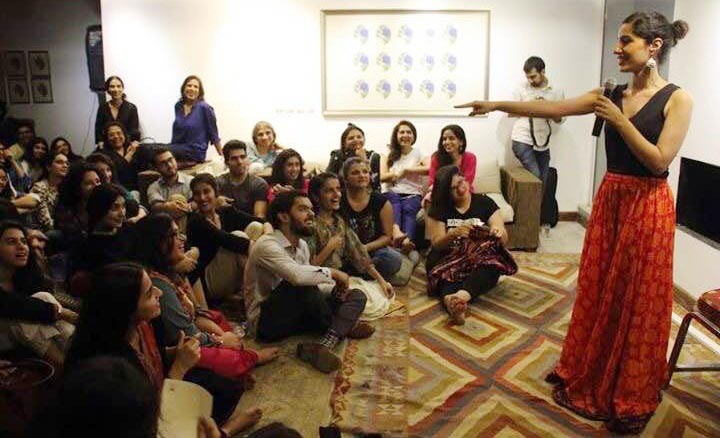
Relatable, refreshing and downright hilarious -- here’s an introduction to Auratnaak

Even as little as five years ago the idea, that 10 female comedians with no background in comedy and no influential family to support them would band together and sell out three consecutive shows in Lahore, was implausible. The assumption has always been that women couldn’t possibly have anything funny to talk about.
The Auratnaak have dispelled that notion, and then some. There is no beating about the bush with this stand-up comedy troupe, they go straight for the kill -- sex, dating, mental illness, bras, boobs, pubes. Everything that would typically make you uncomfortable is discussed, dissected and unpacked with such witty well-timed humour that for the duration of the show you forget that somewhere in your childhood, patriarchy covertly taught you never to discuss n******s in public.
The beauty of the Auratnaak is that they pick up almost-banal experiences that most young women live regularly -- including but not limited to, being groped in public spaces, having your brother/father drop you to the parlour for a threading appointment, being paired with a well-wisher’s cousin (not because you expressed a desire to be coupled but simply because you are single), discovering a stain at the worst possible moment, getting told off for not wearing enough makeup, being scolded for wearing too much make up, having breasts, and in essence, just being female -- and turn them into hilarious anecdotes.
"Every awkward, uncomfortable and untoward experience I have had has now become potential ‘material’," says Zara, a performer for the group.
Feminism was not the original aim of the Auratnaak. When they began collaborating with each other and with Auratnaak in Karachi about a month and a half ago, they self-conducted comedy workshops and began exchanging personal experiences. These stories were then discussed, jokes and punchlines were derived from them, feedback was shared, and that’s how each of the ten sets was created.
"People think that all you need for stand-up comedy is humour, they don’t realise the commitment and hard work that goes into creating a hilarious line up," says Eman, another performer. The other generalisation made about the group is that it’s "provocative for the sake of provocation and feminist because it’s trendy".
"No one sat down with a pen and paper and wrote down ‘provocative’ or ‘feminist’ themes that would be evenly spread out during the show," explains Seerat, who was also part of the latest Auratnaak line-up in Lahore. "The addition of these elements was very organic."
The only guideline they follow for their content is that the routine should be derived from personal experiences, it should be authentic and not filtered down to ‘placate the audience’. That is also what makes their sets so relatable, refreshing and downright hilarious.
"I think the whole idea that we are provocative and feminist has spread because we are female," says Seerat. She doesn’t mean to say they aren’t provocative and feminist, just that "there’s a natural inclination towards feminism, without even meaning to tilt that way, because of our backgrounds", explains Zara; many of the performers are part of Girls at Dhabhas and/or The Feminist Collective.
Consider what she’s saying for a moment; imagine if their humour was ‘family-friendly’ and they were equally hilarious and successful, wouldn’t people still be offended with their existence and the fact that they were feeling so comfortable taking up public place? In the land of Malalas and Qandeels, it’s not common to just let young women do their own thing and claim public space without repercussions.
But that is exactly what the Auratnaak’s slogan is: "Do your own thing, make it funny."
****
It is said that all worthwhile social or political change is uncomfortable. And with Auratnaak this discomfort is viscerally felt. You could want the whole country, especially the men, to experience and laugh with Auratnaak, but at the same time you would fear for when the laughter falls on the wrong ears; you could want Auratnaak to help us realise how petty and limited our modes of thought are, but simultaneously you would be scared of what will happen when too many people are forced into that realisation; any loyal fan would want Auratnaak to showcase their talent, their funnies, and their messages of social impact without limitations, but any loyal fan would also want the Auratnaaks to be safe. For Auratnaak, the line between success and insecurity is too fine.
Fortunately, so far, this band of brave, bold, hilarious and wildly intelligent comedians has not received threats. "But we understand social realities, and our survival instincts ensure that we take our next public steps very carefully," says Eman.
On the internet, the feedback they have received has been largely positive, but in the most recent show there were several people who got up and left because they were ‘offended’ -- one party was offended by jokes on elitism and the famous #anushmunib wedding, others were unclear about their specific trigger, but walked out midway.
If you did go to the show and were offended by the Auratnaaks, or if you didn’t and you’re still arrogant enough to think that what they do is "beyghairat" and unnecessary, then consider this: Pakistan jaisay mulk main ghairat key naam pay qatal baray araam sey ho sakta hai, toh beyghairati key naam pay logon ko hansa kyun nahi saktay?